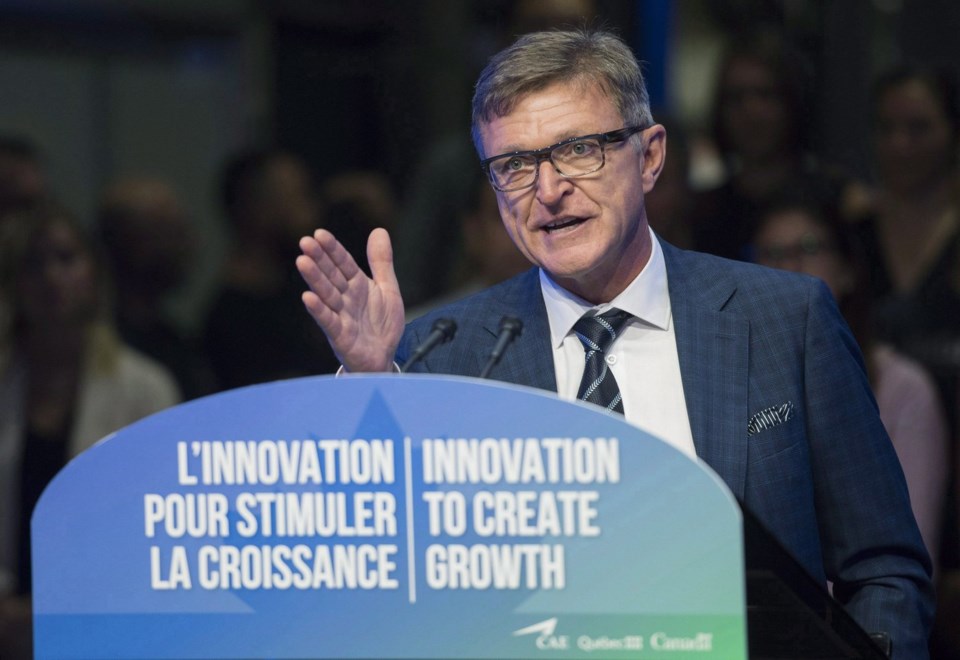MONTREAL — Demand for CAE Inc.'s pilot training services dropped last quarter in step with a decrease in new hires at major airlines and — counterintuitively — lower travel demand brought on by the Paris Olympics.
The smaller need for aviator courses stemmed from "aircraft supply side constraints and special events, namely the Euro Cup and the Paris Olympics," said CEO Marc Parent.
He told analysts on a conference call Wednesday that both events "altered normal travel behaviour" to and from the Continent.
Carriers including Air Canada, Delta Air Lines and Air France have all reported that the Summer Games hurt their seasonal sales, as travellers opted to steer clear of France, where parts of central Paris were closed off for the duration of the event. A tourist boon locally, the Olympics and the Euro Cup — hosted by Germany in June and July — also deterred North American passengers from crossing the pond.
However, sports competitions weren't the only culprits for waning demand.
CAE, which makes flight simulators and trains commercial pilots, cited a broader downturn in need for its services, yielding a 26 per cent year-over-year profit drop in the quarter ended June 30.
Large airlines in the U.S. reduced hiring by 80 per cent year over year in June, Parent said. He pointed to delays at plane manufacturers such as Boeing Co., where production problems have pushed back fleet expansion and pilot training at some carriers. Others have at last filled the hiring gap caused by the travel rebound that followed the COVID-19 pandemic.
"The airline industry is currently managing through what we believe represents the peak of narrow-body aircraft supply headwinds," Parent said.
Indeed, U.S. regulators in May extended a ban on a production ramp-up for Boeing's 737 Max jets — narrow-bodies — amid ongoing safety concerns.
For this fiscal year, CAE forecasted operating income growth of about 10 per cent for its civil segment, smaller than previous expectations of low double-digit growth.
However, Parent remained optimistic about the flight simulator maker's longer-term prospects.
"The demographic realities of an aging pilot population, mandatory age-based retirements and the continued secular growth outlook for air travel are immutable, and they really underlie our continued confidence in the long-term outlook for CAE."
Boeing and Airbus — the two giants of the plane making world — have projected the number of commercial jets will double in the next two decades, he noted.
CAE has already seen an uptick in training bookings for the third and fourth quarters as pilot hiring — on pause at American Airlines and СŔ¶ĘÓƵwest Airlines — resumes at some carriers next year.
The Montreal-based company booked nearly $1.2 billion in total orders in its first quarter for a record $17 billion in adjusted backlog, up by more than half from a year earlier.
Much of the backlog boost owes to CAE's $4.7-billion share of a 25-year crew-training contract with the Royal Canadian Air Force.
RBC Capital Markets analyst James McGarragle cited "solid" earnings margins in the defence division, where the company "is starting to turn the corner" after a tough end to its fiscal year a few months back.
In May, the company reported a half-billion-dollar net loss in its fourth quarter following massive one-time charges linked to that segment, including a $568-million "goodwill impairment."
On Tuesday, the company reported net income attributable to shareholders of $48.3 million in the quarter ended June 30, down from $65.3 million in the same period a year earlier. It said revenue rose six per cent year-over-year to $1.07 billion.
"We see margin headwinds as temporary as we expect OEM (original equipment manufacturer) delays and pilot hiring pauses to alleviate into the end of the year," McGarragle said.
This report by The Canadian Press was first published Aug. 14, 2024.
Companies in this story: (TSX:CAE)
Christopher Reynolds, The Canadian Press



